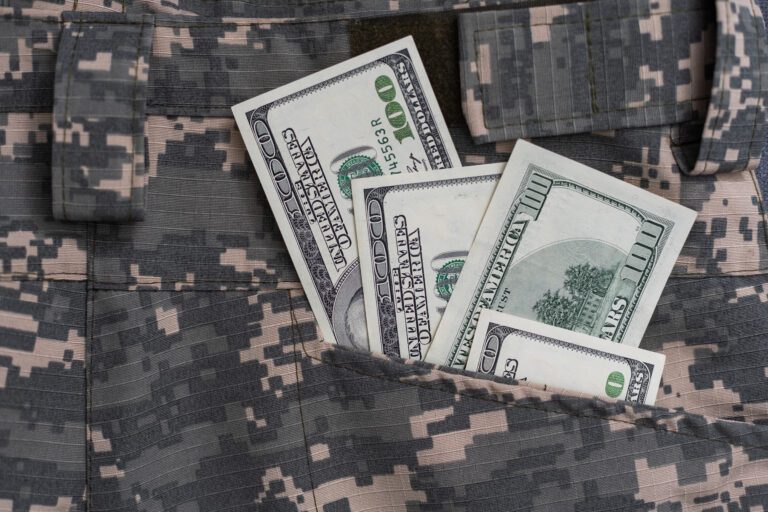Understanding The Process of Debt Relief for Active and Retired Military
Bankruptcy serves as a legal mechanism for individuals and businesses unable to repay their debts. It offers a fresh start through the liquidation of assets or the establishment of a repayment plan. In North Carolina, as in other states, bankruptcy can take several forms, most commonly Chapter 7 and Chapter 13. Chapter 7 bankruptcy involves the liquidation of non-exempt assets to pay creditors, while Chapter 13 bankruptcy allows for a structured repayment plan over three to five years. These options are designed to provide relief and help individuals regain financial stability.
Military Considerations in Bankruptcy Law
For military personnel, specific provisions and protections under the Servicemembers Civil Relief Act (SCRA) can play a crucial role in bankruptcy proceedings. The SCRA offers protections such as reduced interest rates on pre-service debts, protection against foreclosure, and the ability to terminate leases without penalty. These protections are crucial in safeguarding the rights and financial well-being of military members, particularly when facing significant financial hardships.
Local Laws in North Carolina
In North Carolina, bankruptcy laws include both federal statutes and state-specific exemptions. These exemptions allow residents, including military personnel, to protect certain property from being sold during bankruptcy. For instance, North Carolina’s homestead exemption allows individuals to protect a certain amount of equity in their primary residence, while the vehicle exemption protects equity in a personal vehicle. Understanding these local laws is essential for military members considering bankruptcy, as they impact the assets that can be retained through the process.
Benefits of Legal Action
Protection Against Creditors
One of the primary benefits of filing for bankruptcy is the automatic stay, a legal injunction that halts most creditor actions, including collections, lawsuits, and wage garnishments. For military personnel, this protection is invaluable, offering relief from immediate financial pressure and the ability to focus on duties without the added stress of creditor harassment.
Debt Relief Processes
Bankruptcy can discharge or restructure debts, offering a path to financial recovery. In Chapter 7, certain unsecured debts, such as credit card debt and medical bills, can be discharged, providing a clean slate. Chapter 13, on the other hand, enables individuals to catch up on overdue payments through a court-approved repayment plan, which can be particularly beneficial for those with stable income but overwhelming debt.
Common Misconceptions
Myth vs. Reality in Military Bankruptcy
A prevalent myth is that filing for bankruptcy will permanently ruin one’s financial standing. While bankruptcy does impact credit scores, it also offers a structured way to rebuild credit. In many cases, individuals find that their credit improves post-bankruptcy, as they are no longer burdened by unmanageable debt. Another misconception is “will military benefits be affected by bankruptcy” Most military benefits are protected and do not impact bankruptcy proceedings.
Special Military Benefits and Bankruptcy
Some believe that filing for bankruptcy will disqualify them from receiving military benefits. However, benefits such as the GI Bill, pensions, and disability payments are generally exempt from bankruptcy proceedings. This protection ensures that military personnel retain access to essential benefits, even while navigating financial challenges.
Steps to Financial Recovery
Financial Planning Tips for Military Lifestyles
Effective financial planning is crucial for avoiding bankruptcy. Military members should prioritize creating a budget that accounts for their unique circumstances, including frequent moves and potential deployments. Key strategies include building an emergency fund, minimizing debt, and using military-specific financial resources, such as on-base financial counseling services.
Seek Help Before It’s Too Late
Recognizing when to seek legal assistance is vital. Indicators that it might be time to consult a bankruptcy attorney include persistent creditor harassment, the inability to make minimum payments on debts, and the threat of foreclosure or repossession. An experienced attorney can help navigate the complexities of bankruptcy law and explore all available options.
FAQ Section
What are the primary types of bankruptcy available to military personnel?
Military personnel can typically file for Chapter 7 or Chapter 13 bankruptcy, depending on their financial situation and assets.
Will filing for bankruptcy affect my security clearance?
While bankruptcy itself does not automatically affect security clearance, the circumstances leading to financial distress may be scrutinized. Honesty and proactive financial management are key.
Are military pensions protected in bankruptcy?
Yes, military pensions and benefits are generally protected and cannot be taken by creditors in bankruptcy proceedings.
Can I keep my car if I file for bankruptcy?
It depends on the equity in the vehicle and the exemptions allowed under North Carolina law. Many filers can retain their vehicles through Chapter 13 bankruptcy.
Does filing for bankruptcy discharge all debts?
Not all debts can be discharged. Student loans, child support, and certain tax debts are typically not dischargeable.
How long does bankruptcy stay on my credit report?
Chapter 7 bankruptcy stays on a credit report for ten years, while Chapter 13 remains for seven years. However, the impact diminishes over time, especially with responsible financial behavior.
Are VA Disability Payments and Military Retirement Benefits Affected by Bankruptcy?
VA disability payments and military retirement benefits are generally protected from creditors in bankruptcy proceedings. These benefits are considered essential for the support of veterans and their families and are not subject to garnishment or seizure, ensuring that military personnel retain these vital sources of income regardless of their bankruptcy status.
Local Insights for North Carolina’s Military Personnel
North Carolina, home to major military installations like Fort Bragg and Camp Lejeune, offers a range of local resources for military personnel. Financial counseling services, both on and off base, can provide personalized advice and support. Additionally, local community organizations often hold workshops and seminars on financial management, debt relief, and legal rights, tailored to the military community.
How Stubbs & Perdue Can Help You Towards Debt Relief.
If you’re a military member in North Carolina facing financial challenges, consider seeking a consultation with our experienced legal team. Our attorneys focus on bankruptcy and financial law, particularly as they pertain to the unique needs of military personnel. We offer free personalized advice tailored to your situation, ensuring you receive the best possible support and guidance.
Working with a professional can provide clarity and direction during challenging financial times. Our team will help you explore all available options, from debt relief strategies to bankruptcy, ensuring you make informed decisions that protect your future. Contact Stubbs & Perude today to schedule a free consultation and take the first step towards financial recovery.
This blog is intended for informational purposes only and does not constitute legal advice. The information provided herein should not be construed as creating an attorney-client relationship. Each individual’s financial situation is unique, and outcomes can vary. For personalized legal advice, please consult with a qualified attorney.





